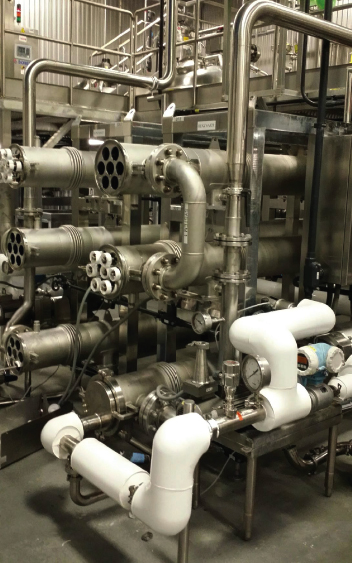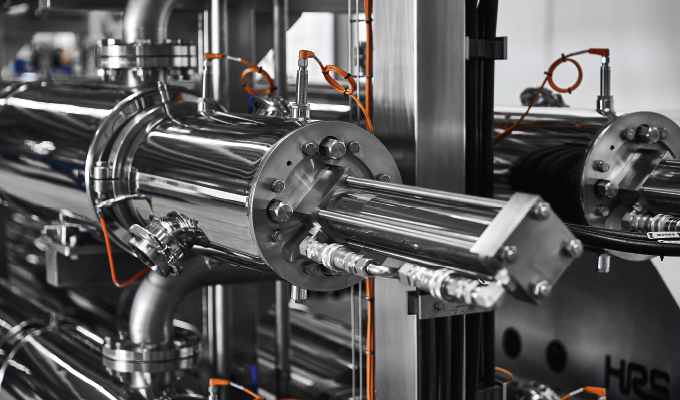By Matt Hale, HRS Heat Exchangers
Scraped surface heat exchangers have been used for difficult heat transfer applications involving viscous fluids or where fouling is an issue, such as evaporation processes. The most common type of scraped surface heat exchanger (SSHE) uses a rotating shaft with blades or augers which scrape the surface of the tube. The popular HRS R Series is based on this approach. However, the design is not optimal for every situation, and so HRS developed the Unicus Series of reciprocating scraped surface heat exchangers.

IT STARTS WITH DESIGN
The HRS Unicus Series is specifically designed to provide the improved heat transfer of a traditional SSHE, but with a gentle action to preserve the quality and integrity of delicate food products such as cheese, yoghurt, ice cream, meat paste, and products containing whole pieces of fruits or vegetables. Over the years, a number of different scraper designs have been developed, meaning that every application, from processing curds to heating sauce or pasteurizing fruit compotes can be handled in the most efficient yet gentle way possible. Other applications where the Unicus Series has been beneficial include handling meat slurry and mince, and processing yeast-malt extracts.
The hygienic design uses a patented stainless-steel scraping mechanism that moves hydraulically back and forth within each interior tube. The movement performs two key functions: it minimizes potential fouling by keeping the tube wall clean and also creates turbulence within the material. Together, these actions increase the rate of heat transfer in the material, creating a highly efficient process that is ideal for viscous and high fouling materials.
Since they are controlled separately, the speed of the scrapers can be optimized for a particular product being processed, so that materials which are susceptible to shear stress or pressure damage (such as creams and custards) can be handled delicately to prevent damage while still providing high levels of heat transfer. The Unicus Series has proven particularly useful in handling viscous food products where texture and consistency are important attributes. For example, some creams or sauces may shear when subjected to excess pressure, making them unusable. The Unicus means that effective heat transfer can be carried out at low pressures which overcomes these problems.
HRS UNICUS SERIES UP CLOSE
Each Unicus SSHE consists of three elements: a hydraulic cylinder and power pack (although in smaller units a pneumatic cylinder can be supplied instead), a separation chamber to ensure hygiene and preserve product separation from the motor, and the heat exchanger itself. The heat exchanger consists of a number of tubes, each of which contains a stainless-steel rod to which the appropriate scraping elements are fitted. Using a range of food-safe materials including Teflon and PEEK (polyether ether ketone), these provide different internal geometry setups according to the application, such as 120-degree scrapers for large particulates and 360-degree scrapers for viscous fluids without particulates.
The Unicus Series is also fully scalable by increasing the shell diameter and adding more interior tubes from a single tube up to eighty in one shell. A key feature is the specially designed seals which separate the inner tube from the separation chamber, tailored to the product application. These seals prevent leakage of the product and ensure internal and external hygiene. A standard range of models for food processing provide heat transfer areas from 7 to 107 square feet, while larger models up to nearly 1,300 square feet can be made for specific uses.
EXCELLENCE IN ACTION
One area where the Unicus Series excels is in evaporation applications, where the prevention of fouling is particularly important. HRS has a specific version of the Unicus for use in evaporation units where volume reduction of the material is essential. The scraping action keeps the heat transfer surfaces clean so that Unicus evaporators can concentrate materials to a level that is unattainable using traditional technologies. Unicus evaporators can be used in multi-effect setups or in combination with mechanical vapor recompression.
Matt Hale is international sales and marketing director for HRS Heat Exchangers. Located in Atlanta, Georgia, HRS Heat Exchangers is part of the HRS Group, which operates at the forefront of thermal technology, offering innovative heat transfer solutions worldwide across a diverse range of industries. With forty years’ experience in the food and beverage sector, specializing in the design and manufacture of an extensive range of turnkey systems and components, incorporating corrugated tubular, and scraped surface heat exchanger technology, HRS units are compliant with global design and industry standards.For more information, visit www.hrs-heatexchangers.com.
MODERN PUMPING TODAY, June 2022
Did you enjoy this article?
Subscribe to the FREE Digital Edition of Modern Pumping Today Magazine!


